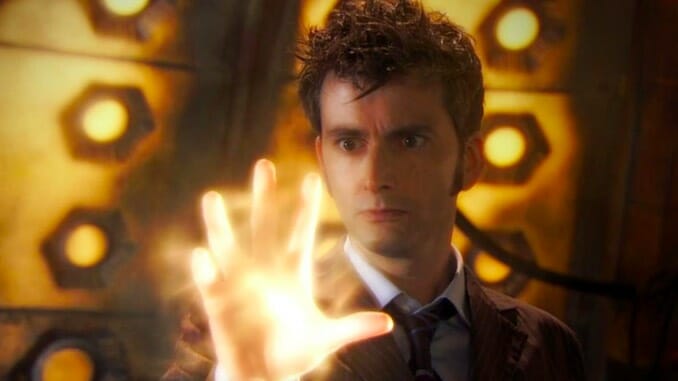It Still Stings: David Tennant Deserved a Better Doctor Who Farewell
Photo Courtesy of BBC One
Editor’s Note: TV moves on, but we haven’t. In our feature series It Still Stings, we relive emotional TV moments that we just can’t get over. You know the ones, where months, years, or even decades later, it still provokes a reaction? We’re here for you. We rant because we love. Or, once loved. And obviously, when discussing finales in particular, there will be spoilers:
![]()
We’ve reached a point of legacy entertainment saturation where our familiarity with how safe the return of beloved characters will be played triggers more hesitance than excitement. Fresh off the back of a stumbling Obi-Wan Kenobi, and resolute that a certain magical world has ceased to conjure any joy, you could empathize with the caution with which I regard the regeneration of my only other childhood obsession: Russell T. Davies era Doctor Who.
I was borderline hysterical about Doctor Who for the first five years of its revived tenure. At the end of Season 1, I was convinced I’d never be on board with Christopher Eccleston’s replacement—but soon into the debut season of the skinny, spiky-haired, Scottish prettyboy David Tennant, a new love was born within me. And yet, like a struggling but stubborn driving student, all things must eventually pass. Across a two-part special on Christmas 2009 and New Year’s Day 2010, not only did Tennant explode into a new, even skinnier version, the show’s steward and pioneer Russell T. Davies also moved on. Sure, Doctor Who would still be a sweet, cheeky, bit-too-clever sci-fi adventure, but something unmistakable about the characters, the mood and the stories told would go away.
Like the inside of the Doctor’s time machine, rooms always felt bigger with Davies’ characters in them. They’d burst with affable charisma and bounce off each other with overpowering chemistry. The most startling moments weren’t climactic confrontations or impassioned, overwritten speeches, but the tender moments where lost people reached out for help. The Doctor wasn’t there to cure every ill that plagued time and space, he was there to show you empathy and kindness, more likely to show you the limits of his powers than the awesome nature of them. In an appropriate act of out-of-time subversion, Tennant’s penultimate adventure sees him deal a fiery sermon at how powerful his loneliness has made him—not unlike those repeated at twice the length and half the meaning in the following Steven Moffat era—before he is dealt a thundering hubristic blow that makes him reconsider his place in time and space. We’re not meant to be impressed by him. We’re meant to see his flaws.
But not everything characteristic of Davies’ era was golden. Some problems he couldn’t help (credit has to be given to production designers for scraping every penny possible from a tiny BBC budget piggy bank), but others were uniquely his. Besides overplaying broad comedy, tonal whiplash was common, derivations of popular sci-fi stories were guaranteed, and frequently a big, explosive story usually resolved with every character standing in one room talking to each other (a screenwriting trap I have yet to learn how to avoid). But the seams in both the scripts and production aligned Davies’ tenure closely with the classic Doctor Who run, where they shot for the moon and worked around their limitations to create an exciting universe out of reusable sets and many, many corridors.
So it’s fitting that the two-part special “The End of Time” encapsulates the best and worst of the Davies era and the Tennant incarnation. It’s sad. It’s funny. It’s 135 minutes. Themes of fate and sacrifice clash against wacky hijinks. It’s chock-full of intended and unintentional silliness, and after stumbling its way to the finish line, it ends on a series of back-to-back high notes. I just wish it was pulled off more smoothly.
-

-

-

-

-

-

-

-

-

-

-

-

-

-

-

-

-

-

-

-

-

-

-

-

-

-

-

-

-

-

-

-

-

-

-

-

-

-

-

-








































